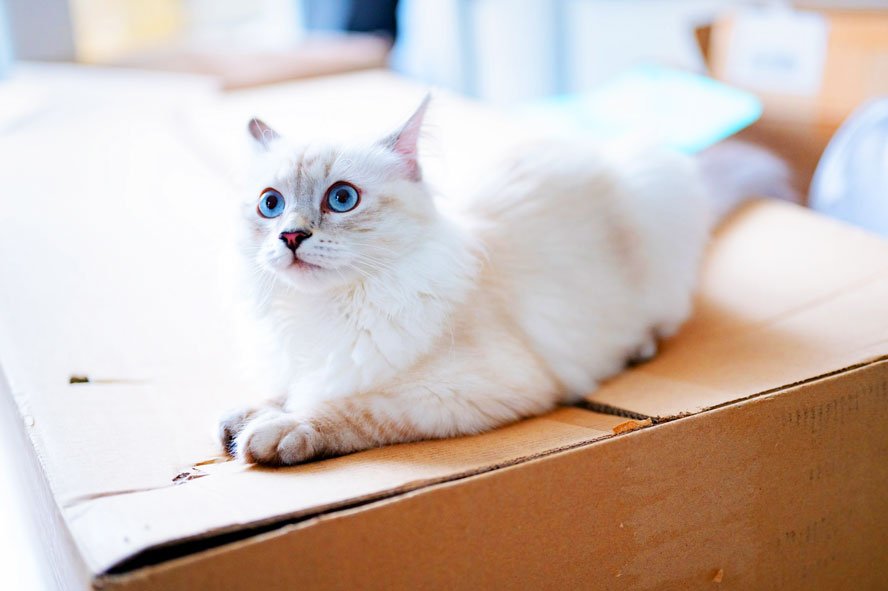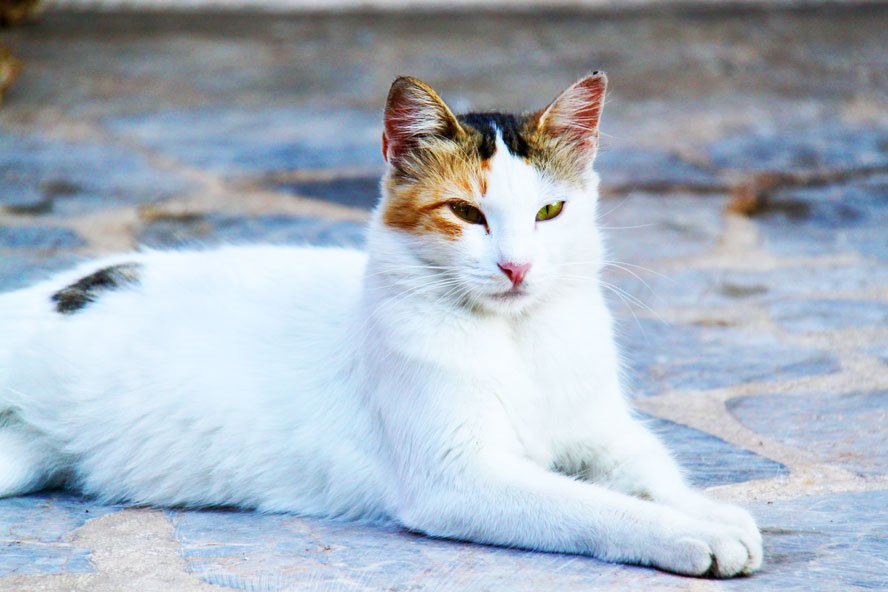cover: Oleg Titberiya | Shutterstock
Cat is breathing with open mouth. Have you ever seen a cat breathing with its mouth open? Dogs often pant, cats rarely do, but it does happen. The mouth usually remains only slightly open and the tongue is stuck out a little.
But why do cats pant? It can be something harmless, but it can also be life-threatening. We show you how to tell the difference and help your cat.
What does it mean when cats have their mouths open?
Most of the time, cats breathe through their nose with their mouth closed. This is how they get enough oxygen to supply the body. However, if there is a need for more oxygen, for example during exertion or illness, they will breathe faster and with their mouths open. In this way, they take in more oxygen from the air, which is transported with the blood to the organs that require more of it. In order to pump the blood through the body even more effectively, the heartbeat also becomes faster.
Cats also release moisture into the air they breathe when they pant, cooling their bodies in hot weather. Unlike humans, cats have only a few sweat glands to sweat with.
A special behaviour is the so-called flehmen to analyse odours, which should not be confused with mouth breathing. Cats suck in the air with their open mouths and sniff intensively. Sometimes they also move their tongues and appear absent-minded.
ClaraMD | Pixabay
There are many causes for mouth breathing
There are some harmless causes of mouth breathing that you can easily recognise. The first is simply exertion - we also breathe faster and deeper when we run and romp. It's the same with your cat. She may pant when playing hard or chasing around the house for several minutes. This allows the muscles to perform better due to an increased supply of oxygen. Once the exertion is over, the breathing will also calm down quickly.
Another reason is very warm ambient temperatures. Breathing with the mouth open cools the body. In addition, your cat will lick itself more often, as the saliva on the fur takes over the function of sweat and also cools.
Stress and anxiety can also cause cats to breathe with their mouths open. This can be triggered by a car journey, for example, but moving or a vet visit can also be perceived as threatening. Put in a state of alarm, the body will increase the breathing rate and the heartbeat, for instance, to be able to flee quickly in case of doubt.
Piotr Musioł | Unsplash
If, on the other hand, your cat permanently leaves its mouth open when breathing and has a pumping breathing movement or if loud breathing noises are audible, it is probably in respiratory distress. You should take your cat to a veterinary practice immediately. Respiratory distress can be caused by a variety of respiratory conditions, such as asthma and pneumonia, or by an injury. For example, after an accident or a fall from a window, the expansion of the lungs can be obstructed when breathing in. And breathlessness can also occur if there is a build-up of fluid in the chest or abdominal cavity as a result of heart disease or FIP. FIP means Feline Interstitial Peritonitis and is a viral inflammation of the peritoneum that occurs mainly in young cats.
And there are even more possible causes. Hyperthyroidism also causes increased respiration, as the metabolism is permanently boosted by too much thyroid hormone. Other symptoms of this chronic disease are weight loss combined with increased appetite, diarrhoea, shaggy coat and sometimes aggressiveness.
These are common causes of open-mouth breathing:
exertion
hot temperatures
great stress and anxiety
respiratory disease
injury to the lungs or chest
heart disease
FIP
Hyperthyroidism
If your cat is panting and breathing heavily
If your cat shows pumping, rapid breathing and is panting, it is an emergency! Sometimes the body cannot take in enough oxygen through normal breathing, so it tries to compensate by breathing faster and deeper. Often the cat also walks restlessly back and forth and only occasionally lies down briefly. This is because the feeling of not being able to breathe properly is very unpleasant and can even cause panic. Another indication of an undersupply of oxygen is a blue colouration of the tongue or paw pads.
What to do if the cat breathes strangely?
If exertion is the reason for the open-mouth breathing, you should simply give your cat a rest. She will calm down on her own. If it is very hot, fresh, cool water and damp towels that you hang up in the flat will help. The evaporation will cool the room temperature down a little. It's best to keep the windows covered all day so that the rooms don't heat up so much, and only open them up in the evening when the air outside has cooled down.
Is your cat sensitive and easily stressed? Slowly getting your cat used to new circumstances or training it with treats can help to relax it more. There are also various calming products available. For example, there are supplementary feeds based on natural substances (e.g. Zylkene®, Telizen® or CBD oil) or anti-stress pheromones (Feliway®) that are vaporised and only work on cats.
If your cat is in respiratory distress, hurry because it is an emergency. However, try not to panic, even if it is difficult. The best way to help your cat is to proceed in an orderly and calm manner. Make sure that the veterinary practice or clinic you want to visit is open and announce the emergency by phone. That way, the vets will be prepared to take care of you without wasting time.
cat in sternal recumbency
E. Diop | Unsplash
Transport your cat in an easy-to-open carrier. Keep a close eye on her and make sure she gets enough air in the kennel. Even if she seems cool, do not cover her head with blankets. If she is very dull, the best thing to do is to place your cat in a sternal position and gently stretch her front legs forward. This gives the most space to the chest and helps her breathe better than lying on her side.
Victoria Ray | Shutterstock
When do I need to go to the vet?
If your cat is constantly breathing with an open mouth, you should visit a veterinary practice as soon as possible. There may be a number of conditions that need to be treated. Often there are also other symptoms. For example, diarrhoea, shaggy coat or weight loss may indicate a metabolic disorder.
Blue paws or pumping, rapid breathing, on the other hand, are signs of respiratory distress. Affected animals are usually very restless and do not eat. If you observe these symptoms, you should immediately take your cat to a veterinary practice. There, it can be given oxygen. They will also examine your cat thoroughly so that the cause of the problem can be identified and specific treatment can be provided.
Conclusion
Cats rarely breathe with their mouths open. If they do, it is usually because they have just exerted themselves. Heat or stress can also cause breathing to become more intense. Normally, after a short time, your cat will behave as before. However, if the mouth breathing persists, more symptoms appear or the cause is not clear, a vet should be consulted. With a thorough examination, various diseases can be detected and ruled out. This way you can be sure that your velvet paw will get the help it needs.
The confidu magazine is written by our veterinarians according to current scientific standards. The articles do not replace a veterinary diagnosis, but are intended to provide you with initial information on many topics related to your animal. If you have specific questions about your pet, our vets will be happy to advise you via the confidu app.









